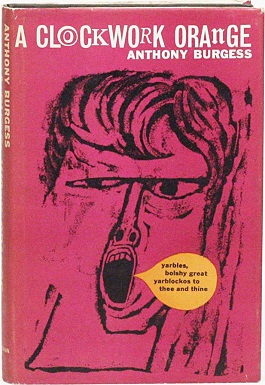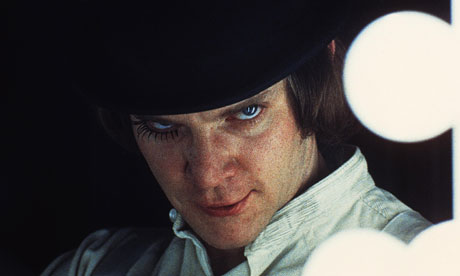If you can manage sitting through the awful narration, that
is to say Nadsat and all the horrors
it brings on sentence structure and half-translations of sentences, then it’s a
good book. I compare it to watching a movie in which the camera work is total
shit and shakey, like Cloverfield or Quantum of Solace or something really nauseating
(I think of this analogy because I recently viewed The Hunger Games and nearly vomited during the entire 2 hours of
shit cinematography). Once you are past all that, it is really a good book,
very moving and insightful.
Children are assholes, we all know this because we were all
children once. But the kids in this book are fierce, terrifying and absolutely
out of control. As if I was not put off enough when he destroys a man’s books
in the early going, they also assault him and leave him bleeding and crawling,
only to move on in the evening and commit a very horrible rape crime that is
worked out in details that are not too vivid, and so less violent and
disturbing at face value, but almost more horrible because the narrator and
perpetrator, Alex, skims along the act and leaves a lot out and it sort of
gives you the idea he isn’t all that bothered by it. As though he needs not
focus too much on the act because it just is not that big a deal to him. Really terrible.
He moves on to committing a few too many senseless crimes
and is later imprisoned for them. Rightfully so. Good, we can all inhale deeply
and take solace in the fact that the justice system is doing its work and bad
people are punished, learn their lesson and life is good, right?
Alex begins to lose his identity in prison, beginning with
losing his name and being referred to only as 655321 during his stay.
Sometimes criminals get out on good behavior, but Alex chooses to get out early
via the Ludovico Technique, a controversial brain-conditioning program that
will reset his behaviours to fearing, terribly, any act of violence or cruelty.
His chaplain, whom he is closest too, warns him of the dangers of losing his
free will and all ability to choose the proper path, but he ignores it. And
just before his procedure, he commits one final act of superior violence by
killing the new inmate that is stirring up trouble with the four of them living
in their cell.
Alex is released to find himself in a struggle. His family
has moved on and so have his old droogs. Though he would like to move on as
well, he is still recognized as a menace and not given the chance he was
promised to fit into society. One of his old droogs and a former rival are now
members of the police and use their power to intimidate, beat and ultimately,
rape him. He’s rescued by the man he once met and knows only by two facts: (1)
that he is the man who writing A
Clockwork Orange when Alex broke into his house and (2) he is the man whose
wife Alex and the gang raped. He learns that she committed suicide sometime
after that and Alex finds himself as a martyr for a cause that is trying to
bring down the oppressive government regime that is responsible for this society
being in its current state.
The pressures of it all plus some bad side effects to Alex’s
conditioning, brain washing really, force him to attempt suicide and the
near-death experience resets his brain and undoes all the washing. So the
violent sociopath is back and really gets his way again. In the final chapter –
omitted from the early US publication and therefore omitted from the Stanley
Kubrick’s film – Alex realizes that he will eventually have a baby and it will
grow up to be as big a piece of shit as him, and he will be as powerless to
stop it as his parents were to stop him, and so on for generations. I have
heard why it was omitted, that many readers would falsely interpret a happy
ending, but it really does belong in there. It gives you a sense of how
difficult it is to change the culture of a violent group in any society.
So the original British version had a much better ending for
me, but the entire book leaves you with a kick in the chest as to how shitty
crime evolves amongst misled youth, gangs, gets treated in the prison system
and in the end, reproduces. Very desperate feeling to it after it is all over
and I dig that.
Lastly, for a little story on how the book was written,
check these strange facts out that I found on Tor.com (a favourite website for
sci-fi/fantasy nerds everywhere).




